Syria: There's a chemical weapons agreement. Now what?
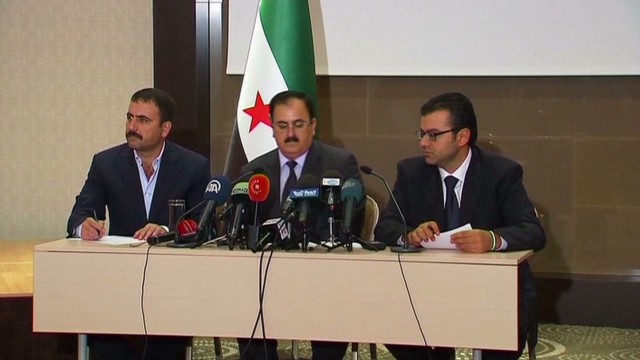
Syrian rebels reject U.S.-Russia deal
Over the weekend, the U.S. and Russia hashed out a new plan to get Syria to give up control of its chemical weapons. Syria says it welcomes the plan.
But will the war-torn
country actually hand over one of the world's biggest stockpiles of
chemical weapons? Or is this just a delaying tactic to get the world off
its back? And if President Bashar al-Assad doesn't comply, what next?
We'll find out in the
coming days. Syria has until next week to provide a full list of all its
chemical weapons and where it's storing them. Today, we hear from a
U.N. report on whether poison gas was used in an attack on Damascus
suburbs on August 21. But here's the hitch: The report won't say who
used it -- the regime or the rebels.
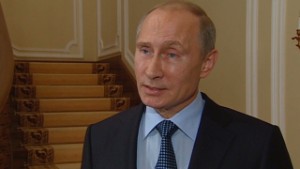 Putin the diplomat
Putin the diplomat
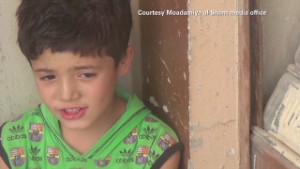 Syrian children suffering malnutrition
Syrian children suffering malnutrition
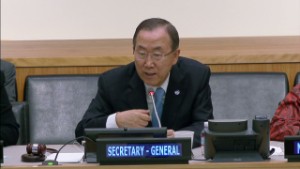 U.N. inspectors submit report on Syria
U.N. inspectors submit report on Syria
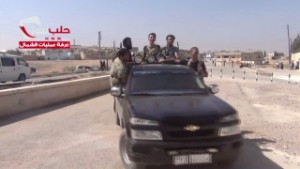 Concern over jihadists in Syria
Concern over jihadists in Syria
As you begin your first day back at work after the weekend, here's a Q&A that'll bring you up to speed on what happens next.
What does the deal say?
The four-page "Framework for Elimination of Syrian Chemical Weapons" basically says:
• Within one week, Syria must submit a full list of its chemical weapons stockpile.
• By November, international inspectors must be on the ground in the country.
• Before the end of November, the inspectors should complete their initial survey of the weapons sites.
• Also before the end of November, all production and mixing or filling equipment must be destroyed.
• By the middle of next year, all chemical weapons material must be destroyed.
That's quite ambitious. Will it have any teeth once the U.N. weighs in?
It's true that plans
often get watered down at the United Nations. This one goes to Security
Council members as early as today. There, members will craft a
resolution that'll keep the process under review and allow the U.N. to
consider the use of force if Syria fails to comply. "If the Assad regime
believes that this is not enforceable, then they will play games," U.S.
Secretary of State John Kerry said Monday. French President Francois
Hollande has said that the council might vote on it by the end of the
week.
'Use of force'? Hasn't Russia consistently said that's a no-go?
Yes, and it's still standing firm on that. So what happens if Syria doesn't comply? More on that below.
Isn't there big news coming today?
A long-awaited report by
U.N. weapons inspectors will be released today, but it'll probably only
confirm what many already suspect -- that chemical weapons were used
near Damascus on August 21. The United States says more than 1,400
people, including children, were gassed to death in that attack. And
that incident set off the flurry of events that has brought us to this
point today. But what the U.N. report won't say is this: Who was behind
the attack -- the regime or the rebels?
So, when is the first real test of Syria's sincerity?
Next week. The regime
has until then to provide its full list: How big its stockpile is, what
kinds of are weapons are in it, and where are they stored.
How big is the stash?
U.S. intelligence
believes Syria has about 1,000 metric tons of chemical weapons, most of
it sarin and VX stored as unmixed components, Kerry said last week.
Sarin and VX are nerve gases that can cause convulsions, paralysis,
respiratory failure and death. And they may be stored in about 50
different sites, the International Institute for Counter-Terrorism in
Israel says.
How many inspectors will it take to get rid of it all?
No one's really sure. The Russian-U.S. plan doesn't specify a number. It says the inspectors will come from the Organisation for the Prohibition of Chemical Weapons,
and the U.N. may have a role. However, David Kay, a former U.N. and
U.S. weapons inspector, thinks it'll take 500 to 1,000 people just to
secure the sites.
What are the major challenges?
Where do we begin? First
off, there's a civil war going on. No one's brought up if troops will
be needed to protect the inspectors as they go about their work.
Then there's the matter of where the weapons will be taken, and how.
The Russian-U.S. plan
mentioned the possibility of collecting and destroying them in the
coastal area of Syria, which is under government control. But who would
protect the convoys headed there? Will the regime fully cooperate? And
will rebels agree to a cease-fire as the weapons are being moved?
The U.S. and Russia say they're working on the details. They say they'll submit something in the next few days.
Given these mammoth challenges, how feasible is it that all stockpiles can be destroyed by mid-2014?
That's a question worth
asking. To put things in perspective, U.N. inspectors who were searching
for Saddam Hussein's stocks of chemical weapons crisscrossed Iraq for
seven years in the 1990s. They had unrestricted freedom of movement. And
even though they were dealing with an obstructive regime, at least they
were not trying to work during a war.
How current is our intelligence about where these sites are? What if Syria's moved its stash?
In a way, Syria is on
the honor system, especially since both U.S. officials and Syrian rebels
suspect the regime has been moving around parts of its stockpile. "I
think we may know where they were, and we may know where maybe a
majority are now," Kay says. "But look, it's going to be up to the
Syrians to disclose where they are and the amounts that they have."
Last week, Gen. Salim
Idriss, head of the rebel Free Syrian Army, said he had information that
the regime has started to move chemical weapons and materials into
Lebanon and Iraq. Iraq denied the allegation, calling it "cheap
propaganda."
So, the ball's in Syria's court -- so to speak. What if it doesn't comply?
Remember that resolution
we talked about earlier that the Security Council is trying to draft?
It allows for use of force to compel Syria to cooperate.
But Russia's against that, right?
Yes, Russia has veto power. And it's consistently said it won't stand for military strikes on its ally Syria.
In that case, what happens?
The U.S. might go it
alone. That option's not off the table. "If diplomacy fails, the United
States remains prepared to act," President Barack Obama has said. Kerry
reiterated the point Monday: "The military option is still on the
table."
Finally, is the situation on the ground any better?
Unfortunately, no. The
bloodshed hasn't stopped for a day. At least 91 people were killed
across Syria on Sunday, including six children, the opposition group
Local Coordination Committees of Syria said. CNN cannot independently
verify daily death tolls, but the United Nations says more than 100,000
people have been killed in Syria since 2011.
No comments:
Post a Comment